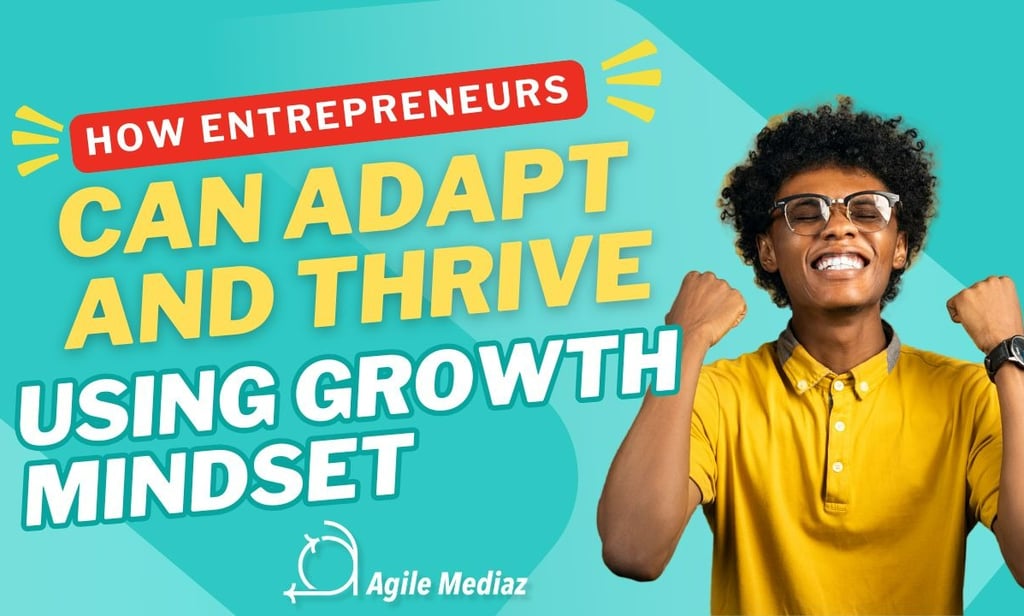How Entrepreneurs Can Adapt and Thrive Using Growth Mindset
A guide to how adopting a growth mindset helps entrepreneurs embrace challenges, learn from failures, and adapt to achieve long-term success.
ENTREPRENEURIAL MINDSETMINDSET & PRODUCTIVITYENTREPRENEURSHIPSTRATEGYSUCCESS STORIES
Agile Mediaz
1/5/20254 min read


Entrepreneurship is a journey filled with challenges, risks, and uncertainties. While talent and resources play a role in success, what often separates thriving entrepreneurs from the rest is their mindset. Enter the growth mindset—the belief that abilities and intelligence can be developed through dedication and hard work. Adopting this perspective enables entrepreneurs to embrace challenges, learn from failures, and continuously improve their ventures.
Here’s how cultivating a growth mindset can help entrepreneurs navigate obstacles, pivot when needed, and scale their businesses effectively, along with real-life examples to inspire you.
What Is a Growth Mindset?
A growth mindset, a concept popularized by psychologist Dr. Carol Dweck, is the belief that skills and abilities aren’t fixed—they can grow and improve over time with effort, learning, and persistence. In contrast, a fixed mindset assumes that abilities are innate and unchangeable, which often leads to a fear of failure and resistance to challenges.
For entrepreneurs, having a growth mindset means:
Viewing failures as opportunities to learn and improve.
Embracing challenges instead of avoiding them.
Believing that effort leads to progress, not just immediate results.
Being open to feedback and new ways of doing things.
With this mindset, entrepreneurs can adapt to changing markets, overcome obstacles, and continually refine their strategies for growth
How a Growth Mindset Helps Entrepreneurs Succeed
1. Embracing Challenges as Opportunities
Entrepreneurs with a growth mindset view challenges as stepping stones rather than roadblocks. Instead of shying away from difficult situations, they tackle them head-on, knowing that each challenge provides an opportunity to learn something new.
For example, Elon Musk faced countless challenges while building Tesla and SpaceX, including technical failures, funding issues, and intense public scrutiny. Yet, his willingness to solve complex problems and learn from setbacks propelled both companies to success.
Takeaway: See every challenge as a chance to grow, and you’ll find creative solutions that push your business forward.
2. Learning From Failures
Failure is inevitable in entrepreneurship, but it doesn’t have to be the end of the story. Entrepreneurs with a growth mindset understand that failure is part of the process, providing valuable insights that can lead to success.
Consider Sara Blakely, the founder of Spanx. Before launching her billion-dollar company, she faced multiple rejections from manufacturers and investors. Instead of giving up, she used the feedback to refine her pitch and product until she found the right partners. Blakely credits her success to embracing failures and treating them as learning opportunities.
Takeaway: When things don’t go as planned, reflect on what went wrong, adjust your strategy, and keep moving forward.
3. Seeking Feedback and Continuous Improvement
Entrepreneurs with a growth mindset are open to feedback, even when it’s uncomfortable. They recognize that constructive criticism can uncover blind spots and help them improve their products, services, or processes.
For instance, Reed Hastings, co-founder of Netflix, credits customer feedback and data analysis for helping the company pivot from DVD rentals to a streaming model. By listening to customer needs and adapting to market trends, Netflix became a global leader in entertainment.
Takeaway: Actively seek feedback from customers, mentors, and peers, and use it to refine your offerings and grow your business.
4. Adapting to Change
In today’s fast-paced business world, change is constant. Entrepreneurs with a growth mindset are better equipped to adapt because they view change as an opportunity to innovate rather than a threat.
A great example is Brian Chesky, co-founder of Airbnb. When the company launched, it struggled to gain traction. Chesky and his team adapted by traveling to their hosts’ homes, gathering feedback, and improving the platform based on what they learned. Their ability to pivot and adapt ultimately turned Airbnb into a global success.
Takeaway: Stay flexible and open to change. Adapting quickly can mean the difference between surviving and thriving.
How to Cultivate a Growth Mindset as an Entrepreneur
Adopting a growth mindset takes practice, but the rewards are worth it. Here are actionable steps to get started:
Reframe Challenges as Opportunities: When faced with obstacles, ask yourself, “What can I learn from this?”
Embrace the Power of Yet: Replace thoughts like “I can’t do this” with “I can’t do this yet.” This simple shift fosters persistence and optimism.
Focus on Progress, Not Perfection: Celebrate small wins and improvements instead of waiting for perfection.
Surround Yourself with Growth-Oriented People: Engage with mentors, peers, and communities that encourage learning and growth.
Reflect and Adjust: Regularly evaluate your actions and outcomes to identify areas for improvement.
Real-Life Example: The Story of Slack
Slack, now one of the world’s leading workplace communication tools, wasn’t always the success it is today. In fact, it started as a gaming company called Tiny Speck. When the gaming platform failed to gain traction, CEO Stewart Butterfield and his team analyzed their failures and realized that their internal communication tool could solve a common problem for businesses.
Instead of clinging to their original vision, they pivoted to focus on Slack, which now serves millions of users worldwide. This willingness to learn from failure and adapt exemplifies the power of a growth mindset.
Final Thoughts: Thrive Through Learning and Adaptation
Adopting a growth mindset is one of the most valuable things an entrepreneur can do. By embracing challenges, learning from failures, seeking feedback, and adapting to change, you can overcome obstacles and unlock new opportunities for your business. Remember, success isn’t about avoiding mistakes—it’s about learning, growing, and becoming better every step of the way.


Connect
Empowering small businesses through digital marketing solutions.
Explore
Innovate
contact@agilemediaz.net
© 2024. All rights reserved.

